
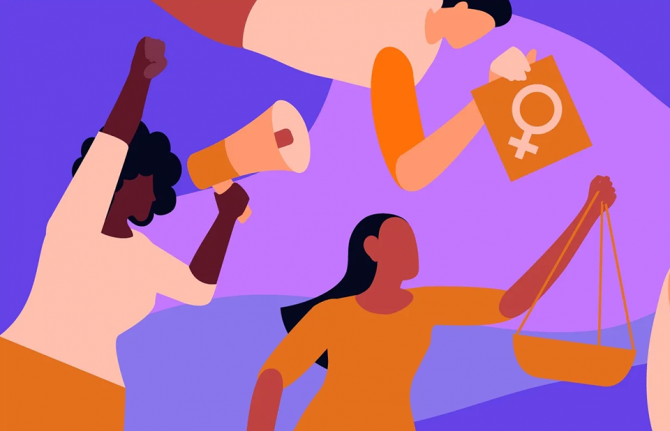
Press Release
UNAIDS calls for an end to violence against women and girls. No excuses
25 November 2024 25 November 2024GENEVA, 25 November 2024—Gender-based violence persists as one of the most appalling violations of human rights. It also thwarts efforts to end AIDS as a public health threat because intimate partner violence is linked with a heightened risk of HIV acquisition among women and undermines access to testing and treatment.
Globally, one in eight women and girls experiences sexual violence before the age of 18. Harmful gender norms, low prioritization of safe, qualitative and affordable sexual and reproductive health services, as well as fragile health systems heighten women’s risk of contracting HIV and prevent access to HIV services.
In addition, women and girls living with HIV are too often stigmatized by health service providers. They also experience pressure not to have children, forced and coerced sterilization or termination of a pregnancy. All violations of human rights.
“We must counter patriarchy and poverty to keep girls in school and we must provide women and girls safe spaces, economic opportunities and ensure their recognition and leadership,” said Winnie Byanyima, UNAIDS Executive Director.
“We must also fight rigid gender norms and stereotypes that perpetuate unhealthy masculinity and violence based on gender."
Gender-related killings of women and girls are the deadliest outcome of gender-based violence with a woman being killed every 11 minutes. This is unacceptable. In 2022, the number of women and girls killed intentionally – nearly 89,000 – is the highest yearly number recorded in the past 20 years. Women from key populations – transgender women, sex workers, and LGBTQ+ human rights defenders - are also at particular risk of femicide according to the Inter-American Commission on Human Rights (IACHR).
On the International Day for the Elimination of Violence against Women this year, the campaign kicked off with the theme ‘UNiTE to End Violence against Women and Girls: Towards Beijing +30.’ These 16 Days of Activism remind us that 30 years after the Beijing declaration - a blueprint for achieving gender equality and women’s and girls’ rights everywhere - the world is far from such a gender equal world.
UNAIDS remains committed to working collaboratively with governments, business, civil society, communities and especially women’s movements and networks to create a world where the rights and dignity of all women and girls are respected and protected, including women and girls living with, at risk of and affected by HIV.
Started in 1991, the 16 Days of Activism against Gender-Based Violence is an international campaign that kicks off on 25 November, the International Day for the Elimination of Violence against Women, and runs until 10 December, Human Rights.
UNAIDS
The Joint United Nations Programme on HIV/AIDS (UNAIDS) leads and inspires the world to achieve its shared vision of zero new HIV infections, zero discrimination and zero AIDS-related deaths. UNAIDS unites the efforts of 11 UN organizations—UNHCR, UNICEF, WFP, UNDP, UNFPA, UNODC, UN Women, ILO, UNESCO, WHO and the World Bank—and works closely with global and national partners towards ending the AIDS epidemic by 2030 as part of the Sustainable Development Goals. Learn more at unaids.org and connect with us on Facebook, Twitter, Instagram and YouTube.

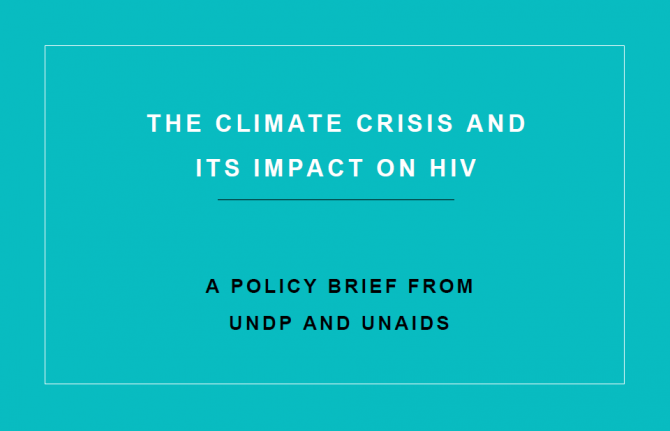
Press Release
Climate emergency risks worsening AIDS epidemic, UN warns at COP29
21 November 2024 21 November 2024Countries facing “triple funding crisis” of insufficient climate finance, insufficient HIV funding, and crippling debt
GENEVA/BAKU, 21 November 2024—The climate crisis could disrupt HIV services and lead to increasing HIV risk for some of the most vulnerable populations, the Joint United Nations Programme on HIV/AIDS (UNAIDS) and United Nations Development Programme (UNDP) have warned at the COP29 Climate Conference in Baku, Azerbaijan.
In a new report, the UN agencies warn that eroded public health infrastructure, heightened prevalence of diseases that interact with HIV, food insecurity, water scarcity, and the mass displacement of people – all likely to intensify due to climate change – could drive new HIV infections and lead to more AIDS-related deaths.
“The progress we have made tackling AIDS is fragile – and it could be unwound by runaway climate change,” said Winnie Byanyima, Executive Director of UNAIDS. “Some of the most climate vulnerable countries also have the highest HIV burden, and are the countries in the greatest debt, compounding injustice on injustice. We need to find ways to ease the triple funding crisis of AIDS, climate, and debt, and invest in the communities on the front lines of these intertwined crises.”
Many of the countries at the sharp end of climate change are also facing the worst impacts of the AIDS epidemic, and climate change is likely to exacerbate the inequalities of AIDS, UNAIDS says. Of the 4,000 adolescent girls and young women aged between 15 and 24 years newly infected with HIV every week, 3,100 live in Sub-Saharan Africa, where severe heatwaves and drought could leave whole regions uninhabitable.
HIV-focused institutions are responding, with 70% of financing from the Global Fund to Fight HIV, Tuberculosis and Malaria set to go to 50 of the most climate-vulnerable countries. But many of these countries are facing a triple funding crisis, with insufficient climate finance, a US$ 9.5billion gap in HIV funding, and the crushing burden of sovereign debt.
Almost half of humanity live in countries spending more on servicing debt than on healthcare. In Western and Central Africa, countries are spending seven times more on repaying debt than on health. With 71% of public climate financing coming as loans rather than grants, the climate crisis will only make this problem worse.
Last year, Malawi was hit by Cyclone Freddy amid a cholera outbreak just as the nation was recovering from COVID-19. Some of the worst hit regions were those with the highest burden of HIV. Around 37 000 people living with HIV were displaced by the storm, forced to navigate overwhelmed services and shortages of medicines – and this is just one of many examples of how climate change is already impacting the HIV response.
At the report launch on the sidelines of the COP29 Climate Conference in Baku, governments will be urged to tackle inequalities, build proper leadership and governance systems, and provide sustainable financing to prevent a climate-induced AIDS crisis.
“At COP29 we can see increasing recognition that the climate crisis is compounding existing health challenges” said Marcos Neto, Director, Bureau of Policy & Programme Support, UNDP. “The AIDS response has shown us what is possible when communities most impacted, governments and institutions unite. By embedding HIV and health considerations into climate action, we can protect hard-won progress, build resilience for the future, and leave no one behind.”
Notes
On Thursday 21 November, UNAIDS and UNDP are hosting a discussion on HIV and climate change at COP29 in Baku, Azerbaijan at the Azerbaijan Pavillion from 14:00-15:00 AZT.
The Climate Crisis and HIV: A Policy Brief from UNDP and UNAIDS is available here.
UNDP
UNDP is the leading United Nations organization fighting to end the injustice of poverty, inequality, and climate change. Working with our broad network of experts and partners in 170 countries, we help nations to build integrated, lasting solutions for people and planet. Learn more at undp.org or follow at @UNDP.
UNAIDS
The Joint United Nations Programme on HIV/AIDS (UNAIDS) leads and inspires the world to achieve its shared vision of zero new HIV infections, zero discrimination and zero AIDS-related deaths. UNAIDS unites the efforts of 11 UN organizations—UNHCR, UNICEF, WFP, UNDP, UNFPA, UNODC, UN Women, ILO, UNESCO, WHO and the World Bank—and works closely with global and national partners towards ending the AIDS epidemic by 2030 as part of the Sustainable Development Goals. Learn more at unaids.org and connect with us on Facebook, Twitter, Instagram and YouTube.


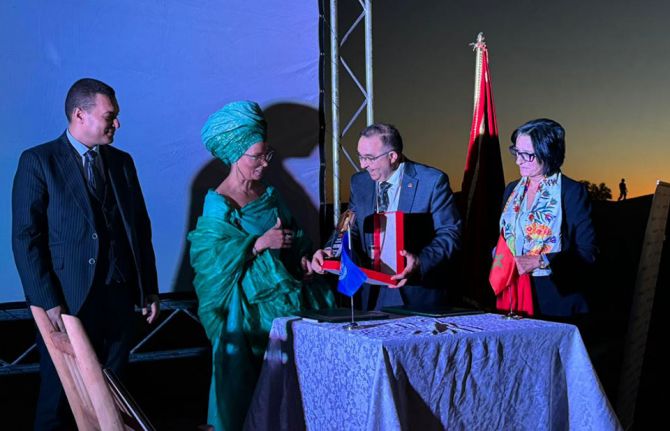
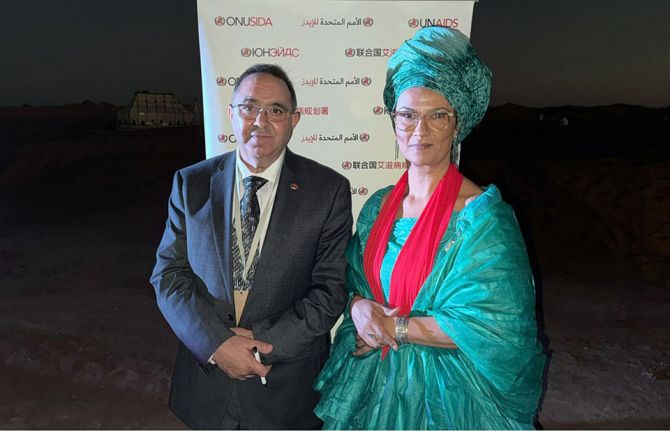
Press Release
UNAIDS appoints the artist OUM as National Goodwill Ambassador in Morocco
02 November 2024 02 November 2024MHAMID AL GHIZLANE, 2 November 2024 — The Joint United Nations Programme on HIV/AIDS (UNAIDS) is pleased to announce the appointment of renowned Moroccan artist OUM as its National Goodwill Ambassador in Morocco. The prestigious announcement was made at the Taragalte Festival, held from November 1-3, 2024, in Mhamid El Ghizlane, where OUM proudly serves as the festival's ‘Godmother.’ OUM’s influence and commitment to social change will play a vital role in UNAIDS' efforts to combat HIV/AIDS in Morocco and beyond.
“OUM’s appointment as National Goodwill Ambassador is a powerful step forward in our efforts to fight against HIV in Morocco,” said Houssine El Rhilani, UNAIDS Country Director for Morocco. “Her artistic influence and commitment to social causes will help amplify our messages of prevention, tolerance, and support for people living with HIV.”
In her new role, OUM will work to promote awareness and education around HIV prevention. She will also focus on fighting against the stigma and discrimination faced by people living with HIV. “As an artist, I have a platform to reach many people. It is my duty to use my voice to advocate for people living with and affected by HIV who are often unheard,” said OUM. “I am honored to take on this role with UNAIDS and am committed to supporting the fight against HIV in Morocco.”
Morocco faces significant challenges in the fight against HIV, with approximately 23,000 people currently living with the virus. The National Integrated Strategic Plan for HIV, Viral Hepatitis, and STIs (2024-2030) outlines essential actions to strengthen HIV prevention efforts and improve access to care, particularly for populations most affected by HIV. OUM's role as an ambassador is vital in driving these efforts forward.
OUM is no stranger to social advocacy, having previously collaborated with various United Nations agencies. Her engagement includes speaking on international platforms and participating in initiatives promoting women's rights and education. The official ceremony for OUM’s appointment highlighted her commitment to raising awareness around HIV issues in Morocco. It featured speeches from local leaders, including representatives from the region of Zagora and the Ministry of Health and Social Protection. The festival itself serves as a cultural backdrop, emphasizing the power of music and art in promoting peace and social change.
As UNAIDS continues its mission to end AIDS as a public health threat by 2030, collaboration with influential figures like OUM is crucial. Her role as National Goodwill Ambassador will not only increase awareness but also inspire collective action to ensure that all people affected by HIV, regardless of their status, have access to the care and support they need.
UNAIDS
The Joint United Nations Programme on HIV/AIDS (UNAIDS) leads and inspires the world to achieve its shared vision of zero new HIV infections, zero discrimination and zero AIDS-related deaths. UNAIDS unites the efforts of 11 UN organizations—UNHCR, UNICEF, WFP, UNDP, UNFPA, UNODC, UN Women, ILO, UNESCO, WHO and the World Bank—and works closely with global and national partners towards ending the AIDS epidemic by 2030 as part of the Sustainable Development Goals. Learn more at unaids.org and connect with us on Facebook, Twitter, Instagram and YouTube.
Region/country

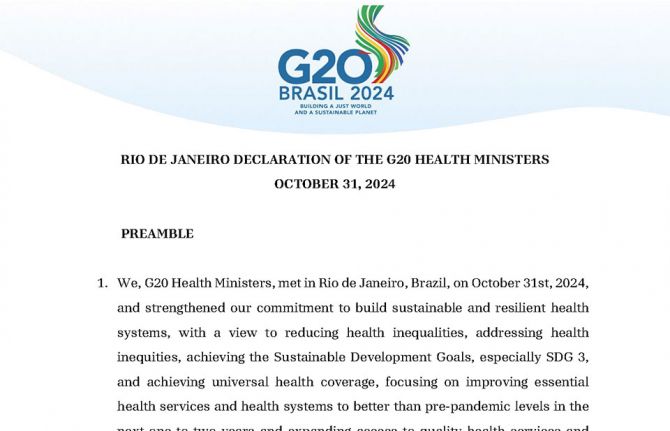
Press Release
G20 commits to fighting the inequalities driving AIDS and other pandemics. Leaders back new initiative to widen production of medicines in every region
01 November 2024 01 November 2024RIO DE JANEIRO, BRAZIL, 1 November 2024 — Ministers at the G20 Ministerial in Rio De Janeiro have made new commitments to tackle AIDS and other pandemics, through addressing the inequalities driving them, both globally and nationally.
The commitments have been welcomed as a potential breakthrough against AIDS and other pandemics by international experts including Nobel Prize Winning Economist Joseph E. Stiglitz, world-leading epidemiologist Sir Michael Marmot, and former First Lady of Namibia Monica Geingos. The experts, who are the Co-Chairs of the Global Council on Inequality, AIDS, and Pandemics established by UNAIDS, have been in Brazil as part of the Council’s engagement of the G20.
G20 leaders have committed, for the first time, to prepare to confront future pandemics by tackling the inequalities which drive them—addressing the social determinants driving pandemics. Committing to measure and address social determinants—factors like education, income inequality, and discrimination that have proven as important to pandemic preparedness and response as medical care—reflects an important step in addressing key drivers of health emergencies.
G20 leaders have also backed a new “Global Coalition for Local and Regional Production, Innovation and Equitable Access” to overcome unequal access to vaccines, therapeutics and diagnostics, and other health technologies that often drive disease. The new coalition will address both neglected diseases like Dengue—a climate-driven virus that affects many of the world’s most vulnerable—and medicines for people in vulnerable situations like people living with HIV and TB.
The ministers stressed the importance of moving from promises to actions, and emphasized the importance for health of robust investments.
UNAIDS Executive Director Winnie Byanyima, who convened the Global Council on Inequality, AIDS, and Pandemics, praised “Brazil’s remarkable leadership”. It is because of that leadership, she noted, that “G20 countries have recognized the social determinants of pandemics like AIDS, and have agreed to address unequal access to medicines through a Global Coalition on Local and Regional Production. This visionary, politically feasible solution could transform global health for as long as it remains bold in vision and wide in scope.”
Joseph E. Stiglitz congratulated Brazil for “having been able to forge consensus on very difficult and very important concrete issues, which is a real source of hope.”
Monica Geingos stated: “Brazil’s leadership has been central in making sure that tackling inequality has been taken up by the G20, and that the social determinants of pandemics are addressed.”
Sir Michael Marmot concluded: “Putting equity at the heart of policy making creates the opportunity to build societies where everyone can flourish.”
South Africa will carry forward these agendas under its G20 Presidency in 2025. The Global Council on Inequality, AIDS and Pandemics will support its work.
The G20 Ministerial Declaration can be downloaded here or from the G20 site here: https://www.g20.org/pt-br/trilhas/trilha-de-sherpas/saude/hwg-ministerial-declaration-rio-de-janeiro-eng.pdf/@@download/file

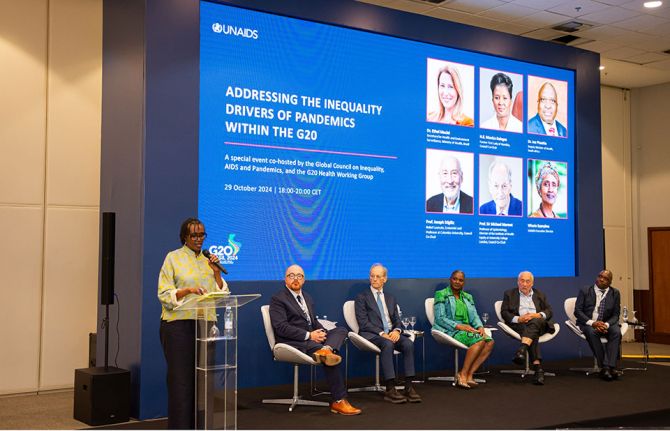
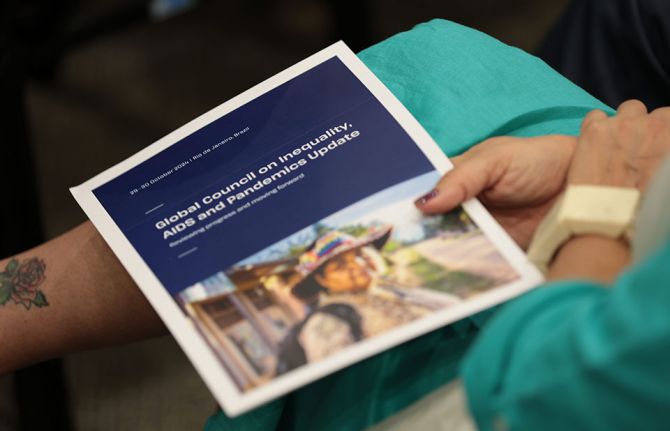
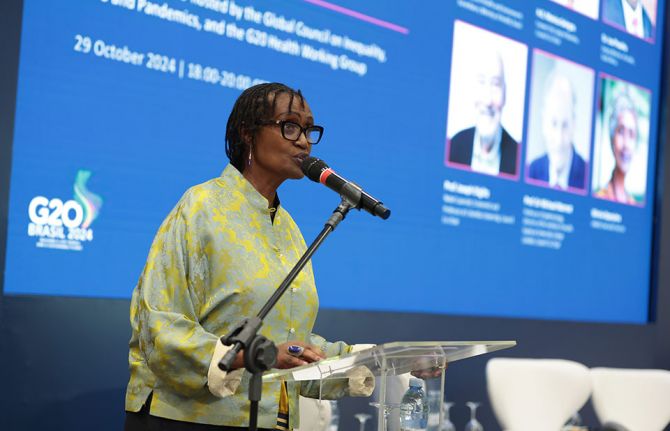
Press Release
Experts back G20 action to tackle pandemics by addressing the inequalities which drive them and by boosting production of medicines in every region of the world
29 October 2024 29 October 2024RIO DE JANEIRO, BRAZIL, 29 October 2024—Today, at a special event organized for the G20 Joint Finance and Health Ministerial, the Brazilian government and experts from the Global Council on Inequality, AIDS and Pandemics backed calls for efforts to break the “inequality-pandemic cycle” that is fueling continued disease emergencies. Two crucial measures could enable the world to tackle current and future pandemics.
They urged leaders to recognise, for the first time in G20 history, inequality as a driver of pandemics, requiring both measurement and decisive action. They also championed boosting the development, production and supply of life-saving health products in every region of the world.
Evidence gathered by the Global Council on Inequality clearly demonstrates the inequality-pandemics cycle. Inequalities within countries and between them deepen the disruption and loss of life in current and recent pandemics, from AIDS to COVID, mpox and Ebola. Failure to address these inequalities is leaving communities across the world vulnerable and exposed to future outbreaks. This presents an important opportunity for the G20, which sets the agenda for international financing, to focus attention and action on the social determinants of pandemics.
The dependence of countries across the Global South on medicine production in the Global North has also been shown to undermine pandemic responses. They are consistently last in line to receive life-saving vaccines and medicines, despite bearing much of the world’s disease burden.
Nísia Trindade, Brazil’s Minister of Health, who is also a member of the Global Council on Inequality, AIDS and Pandemics, declared: “By building production capacity in every region, we can learn from past mistakes by ensuring that medicines for neglected and socially determined diseases are made around the world and that capacity is available to respond swiftly to future outbreaks.”
Joseph E. Stiglitz, Nobel Prize Winning Economist, Co-Chair of the Global Council on Inequality, AIDS and Pandemics, explained: “Reforms in both the developed and developing countries and in international agreements and institutions, and investments which help broaden the production of medical products and reduce prices are vital to address market failures and accelerate access to medicines for the people in greatest need.”
Sir Michael Marmot, Professor of Epidemiology and Director of the Institute of Health Equity at University College London, Co-Chair of the Global Council on Inequality, AIDS and Pandemics noted: “The evidence is clear: social determinants increase the intensity of pandemics. The greater the inequality in society, the worse is the pandemic. But we also know we can intervene against these with education, social protection measures, and making societies more fair. Re-investing in the public good and upholding of human rights will make societies less vulnerable to pandemics.”
H.E. Monica Geingos, former First Lady of Namibia and Co-Chair of the Global Council on Inequality, AIDS and Pandemics set out: “To effectively end the AIDS pandemic and prepare for future health crises, we must confront the complex web of inequalities that exacerbate these challenges. Inequality encompasses more than just income disparities; it includes social, political, and health inequities that intersect in significant ways. The geopolitical landscape further complicates these dynamics, as nations characterized by pronounced inequality are disproportionately impacted by the responses to pandemics. This systemic inequality is often reinforced by international frameworks that perpetuate and deepen existing disparities, underscoring the urgent need for comprehensive and equitable approaches to health and governance.”
The two initiatives—addressing inequality as a pandemic driver and the move to boost regional health product production— offer a unique opportunity for G20 leaders to take transformative action towards greater health equity and global health security, speakers agreed.
Winnie Byanyima, UNAIDS Executive Director and Convenor of the Inequality Council, remarked: "President Lula has put equality at the heart of Brazil’s G20 agenda. He is right. Inequalities need to be addressed urgently, and the production of medicines and vaccines expanded across the world, or the next pandemic will hit us even harder. G20 leaders here in Rio have the opportunity to transform the way the world responds to outbreaks and pandemics by tackling the inequalities which drive them. We are counting on G20 leaders to seize this moment to save lives and protect the health of everyone.”
Joe Phaahla, Deputy Minister of Health, South Africa, confirmed: “As we assume the G20 presidency in 2025, South Africa will continue to champion the agenda of universal health coverage through equity, solidarity and innovation.”
Tributes were paid to the Ministry of Health in Brazil for its leadership in advancing these critical issues at the G20, including proposing a new Global Coalition for Regional Production, Innovation and Equitable Access and including social determinants of pandemics in the work of the G20 Joint Health and Finance Ministers task force.
Notes for editors
Brazil proposes the establishment a Global Coalition for Regional Production, Innovation and Equitable Access Alliance for Regional Production and Innovation. It is bringing together a network of key actors, including countries, academia, private sector, and international organizations, for research and development and production of vaccines, medicines, diagnostics, and strategic supplies to combat diseases with strong social determinants and that mainly affect vulnerable populations. For more information on the G20 Health Working Group, see the G20 website: https://www.g20.org/en/tracks/sherpa-track/health
About the Global Council on Inequality, AIDS and Pandemics
The Council was established by UNAIDS in 2023 and is comprised of experts from academia, government, civil society and international development actors committed to implementing evidence-based solutions to address inequalities fuelling AIDS and other pandemics. It is chaired by Nobel Laureate Professor Joseph Stiglitz, Former First Lady of Namibia Monica Geingos, and Professor Sir Michael Marmot who chaired the Commission on Social Determinants of Health. Learn more at inequalitycouncil.org.
UNAIDS
The Joint United Nations Programme on HIV/AIDS (UNAIDS) leads and inspires the world to achieve its shared vision of zero new HIV infections, zero discrimination and zero AIDS-related deaths. UNAIDS unites the efforts of 11 UN organizations—UNHCR, UNICEF, WFP, UNDP, UNFPA, UNODC, UN Women, ILO, UNESCO, WHO and the World Bank—and works closely with global and national partners towards ending the AIDS epidemic by 2030 as part of the Sustainable Development Goals. Learn more at unaids.org and connect with us on Facebook, Twitter, Instagram and YouTube.
Contact
Ben PhillipsUNAIDS Communications Director
phillipsb@unaids.org
UNAIDS Brazil Advocacy and Communication Officer
Thainá Kedzierski
KedzierskiTH@unaids.org
Watch
Region/country

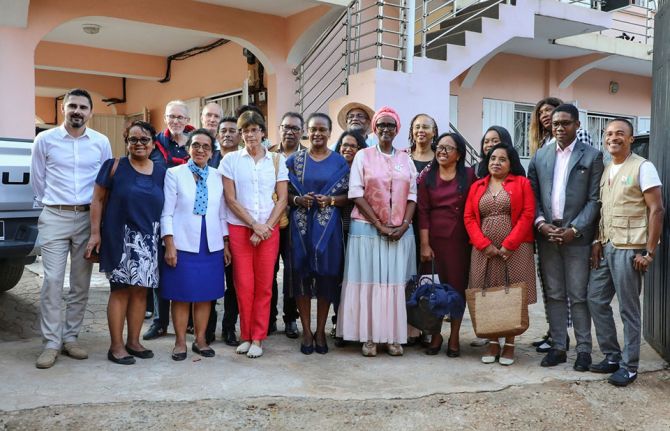
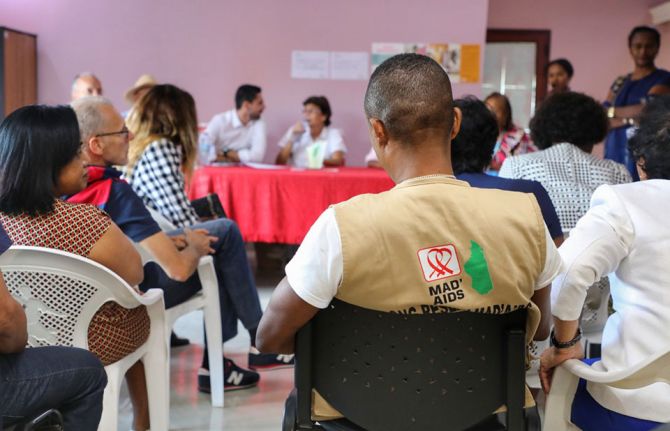
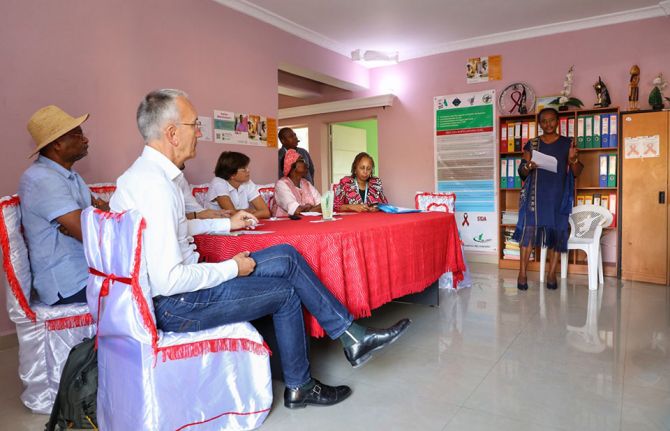
Press Release
UNAIDS calls for global solidarity to strengthen Madagascar’s HIV response to end AIDS as a public health threat
21 October 2024 21 October 2024GENEVA, 21 October 2024—The Executive Director of UNAIDS Winnie Byanyima is calling for accelerated global solidarity to strengthen Madagascar’s response to HIV, including preventing new HIV infections and expanding access to treatment, to end AIDS as a public health threat. Ms Byanyima is visiting the country between 19–24 October to support its response to the HIV epidemic. Madagascar has seen dramatic increase in new HIV infections since 2010 and a 158% increase in AIDS-related deaths over the same period. UNAIDS is concerned about what appears to be a dramatic increase in new HIV infections.
Ms Winnie Byanyima’s visit to Madagascar coincides with that of H.S.H Princess Stéphanie of Monaco, who is visiting Madagascar through the work that she does with Fight AIDS Monaco around the world, including in Madagascar, to end AIDS as a public health threat. Fight AIDS Monaco has been supporting Madagascar’s efforts to prevent new HIV infections, including ending stigma against people living with HIV and galvanising international solidarity to support efforts to end AIDS.
“Madagascar is experiencing a rapid increase in the number of new HIV infections in communities, in stark contrast to the regional trend where new HIV infections are declining,” said Ms Winnie Byanyima, Executive Director of UNAIDS. “Madagascar’s pandemic is driven by gaps in HIV prevention and glaring inequalities which must be urgently addressed.”
In 2023 there were an estimated 76 000 people living with HIV in Madagascar and around 3100 people died of AIDS-related illnesses. Gaps in data gathering and weak surveillance systems make estimating the scale of the pandemic difficult. Stockouts of HIV testing kits and limited access to testing facilities further hinder accurate data collection in communities.
In addition, the majority of people living with HIV do not have access to treatment. Only 22% of the estimated 76 000 people living with HIV in Madagascar had access in 2023.
In northern Manakara HIV testing campaigns by the Ministry of Health have shown urban HIV prevalence rates ranging from 3% to 18% among the population. There is a need to strengthen comprehensive data gathering to better inform the national HIV response to effectively tackle the pandemic.
UNAIDS has been actively supporting Madagascar’s HIV response, especially in strengthening the surveillance systems to ensure more accurate and comprehensive data collection. UNAIDS has also been supporting the implementation of HIV testing and counselling services and helping to expand access to antiretroviral therapy.
Madagascar is one of the most unequal countries in the world, a factor which is driving new HIV infections. In 2023, the World Bank estimated the country’s poverty rates at 62.6%. Madagascar has been hit by cyclical natural disasters including drought in the south and cyclones, making it difficult for the country to recover and mount an effective response to HIV.
“Madagascar can scale up its response to HIV but urgently needs technical and financial support from the international community to ensure that HIV prevention commodities, including condoms, testing kits and antiretroviral treatment are available to everyone in need,” said Ms Byanyima.
UNAIDS
The Joint United Nations Programme on HIV/AIDS (UNAIDS) leads and inspires the world to achieve its shared vision of zero new HIV infections, zero discrimination and zero AIDS-related deaths. UNAIDS unites the efforts of 11 UN organizations—UNHCR, UNICEF, WFP, UNDP, UNFPA, UNODC, UN Women, ILO, UNESCO, WHO and the World Bank—and works closely with global and national partners towards ending the AIDS epidemic by 2030 as part of the Sustainable Development Goals. Learn more at unaids.org and connect with us on Facebook, Twitter, Instagram and YouTube.
Region/country

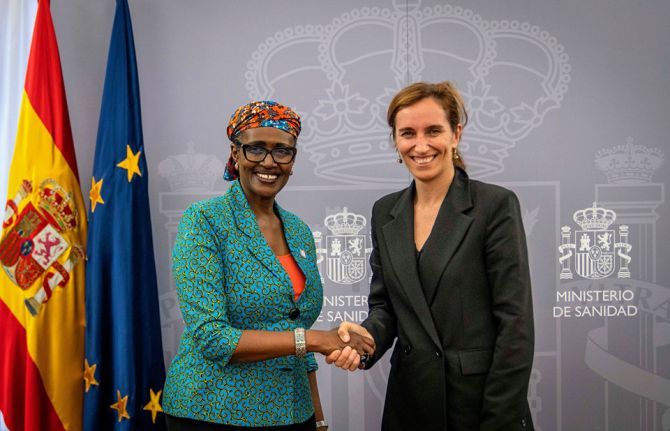
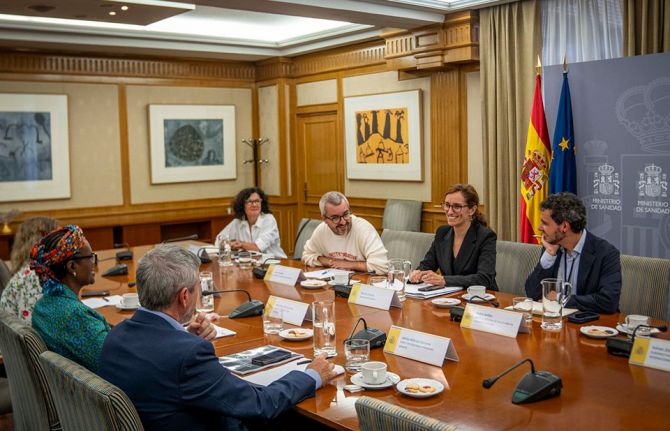
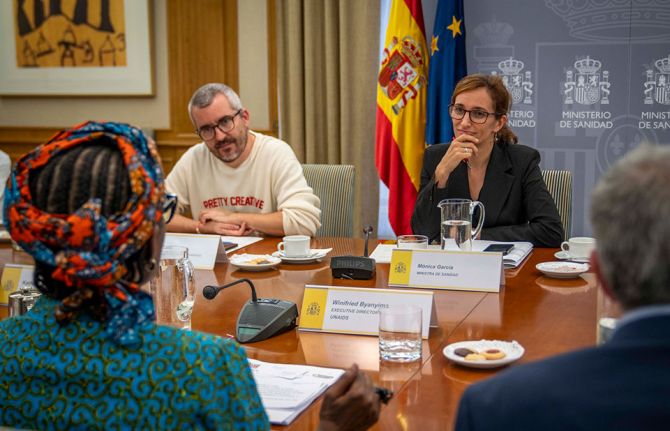
Press Release
UNAIDS welcomes the Spanish government’s announcement of a new € 1 million contribution to overcome the global AIDS pandemic
15 October 2024 15 October 2024GENEVA, 15 October 2024—The Spanish government has today announced a further € 1 million contribution to UNAIDS to support its work to end AIDS by 2030 as part of Sustainable Development Goals. The announcement was made following a meeting between Spain’s Minister of Health Mónica García Gómez and the Executive Director of UNAIDS Winnie Byanyima in the country’s capital Madrid.
“We warmly welcome Spain’s commitment to ending AIDS,” said Ms Byanyima. “We are at a critical moment in the response to HIV, and the path global leaders take this year will determine whether the pandemic continues indefinitely or we end AIDS by 2030. Spain’s solidarity with UNAIDS and the global AIDS response, and its commitment to tackling stigma and discrimination, is testament to their determination to get the world on track to end AIDS and save millions of lives. Spain has set an example for the rest of the world.”
Spain is a long-standing champion of the right to health. During the Spanish Presidency of the Council of the European Union in the second half of 2023, Spain made the fight against stigma and discrimination associated with HIV a political priority. Spain also joined the Global Partnership for Action to Eliminate all forms of HIV-related Sigma and Discrimination and is moving forward with its implementation plan to eliminate stigma in health, workplace and education settings.
UNAIDS looks forward to continuing to strengthen its partnership with Spain to advance progress towards global targets, and to build a robust and rights-based response to end AIDS by 2030 and sustain the gains into the future.
UNAIDS
The Joint United Nations Programme on HIV/AIDS (UNAIDS) leads and inspires the world to achieve its shared vision of zero new HIV infections, zero discrimination and zero AIDS-related deaths. UNAIDS unites the efforts of 11 UN organizations—UNHCR, UNICEF, WFP, UNDP, UNFPA, UNODC, UN Women, ILO, UNESCO, WHO and the World Bank—and works closely with global and national partners towards ending the AIDS epidemic by 2030 as part of the Sustainable Development Goals. Learn more at unaids.org and connect with us on Facebook, Twitter, Instagram and YouTube.
Region/country

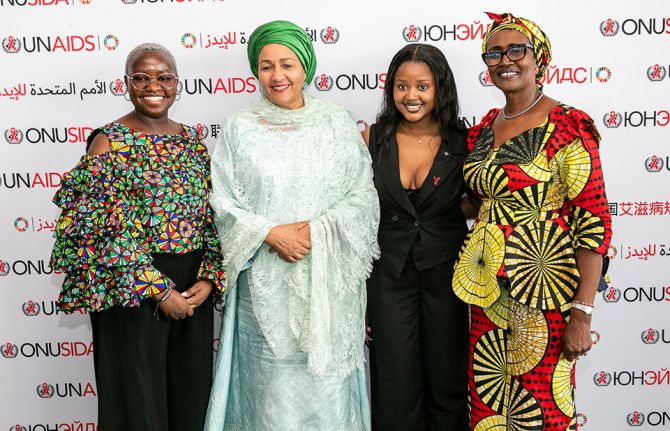

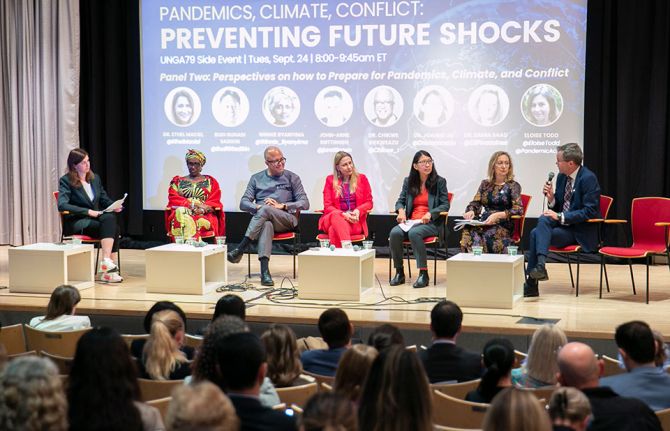
Press Release
The AIDS response is recognized as a beacon of hope and guide for revitalizing multilateralism at the 79th UN General Assembly
27 September 2024 27 September 2024NEW YORK/GENEVA, 27 September 2024—At the 79th United Nations General Assembly (UNGA79) and the Summit of the Future in New York, global leaders called for the revitalization of multilateralism to address pressing global crises, drawing on the success of the global AIDS response as a model of hope and global solidarity.
"Multilateralism is not a theory – it is the way we save lives and keep the world secure,” Winnie Byanyima, Executive Director of UNAIDS, told the General Assembly. “When leaders work together for a common mission – anything is possible.”
At a special event convened by UNAIDS, the U.S. President’s Emergency Plan for AIDS Relief (PEPFAR), and the Global Fund to Fight AIDS, Tuberculosis, and Malaria on 24 September 2024, leaders from governments, communities, business, and international organizations all testified to how multilateralism had driven the extraordinary gains made in the fight against AIDS, and how the path to addressing other global challenges had been illuminated by the global HIV response.
“The AIDS response shows what is achievable when leaders unite, when communities are empowered, when inequalities are tackled, when human rights are protected and when science-based policy is backed by political will,” said United Nations Deputy General-Secretary, Amina Mohammed.
UNAIDS data shows that at the end of 2023, more than 30 million people were accessing life-saving HIV treatment, compared to just 7.7 million in 2010. The data also show that since 2010, AIDS-related deaths have been halved, and new HIV infections among children have been reduced by 62%.
Across the week of the UN General Assembly, leaders set out concrete commitments to ending AIDS by 2030. These include closing gaps in access to HIV prevention, treatment and care, ending stigma and discrimination, accelerating innovation and access to new HIV technologies, and mobilizing domestic and donor resources for the HIV response.
UNAIDS set out how ensuring the end of AIDS as a public health threat, and enabling the success of the Sustainable Development Goals, require bold action to tackle global inequalities. Ms Byanyima shone a light on the financing crisis which is choking sub-Saharan Africa, leaving health and HIV services chronically underfunded. "Public debt needs to be urgently reduced and domestic resource mobilization strengthened to fully fund the global HIV response and end AIDS by 2030," said Ms. Byanyima.
Two young HIV activists, Ibanomonde Ngema from South Africa and Jerop Limo from Kenya, supported by UNAIDS to meet leaders at the UN General Assembly, called on governments to work with young people as partners. "Young people are key to ending AIDS. Leaders need to listen to us and include us in policy-making to ensure the progress made is sustained," said Jerop Limo.
Watch Special Event: Revitalized Multilateralism: Recommitting to Ending AIDS Together
UNAIDS
The Joint United Nations Programme on HIV/AIDS (UNAIDS) leads and inspires the world to achieve its shared vision of zero new HIV infections, zero discrimination and zero AIDS-related deaths. UNAIDS unites the efforts of 11 UN organizations—UNHCR, UNICEF, WFP, UNDP, UNFPA, UNODC, UN Women, ILO, UNESCO, WHO and the World Bank—and works closely with global and national partners towards ending the AIDS epidemic by 2030 as part of the Sustainable Development Goals. Learn more at unaids.org and connect with us on Facebook, Twitter, Instagram and YouTube.

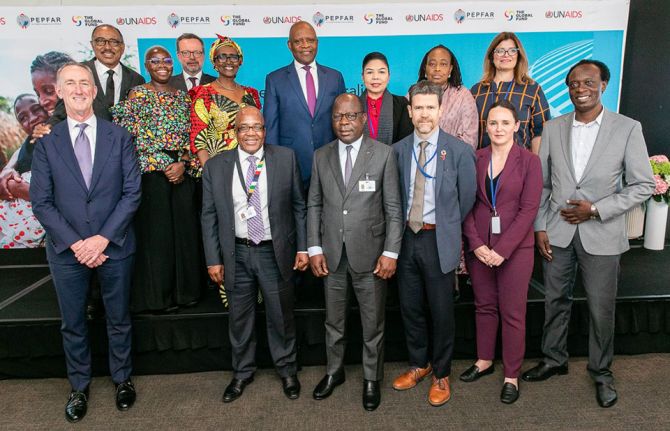
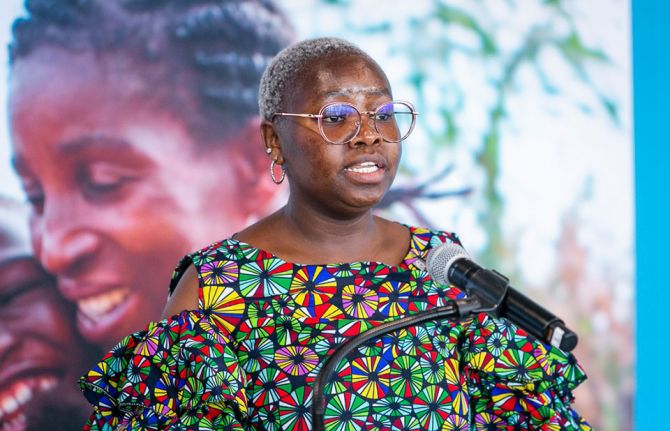
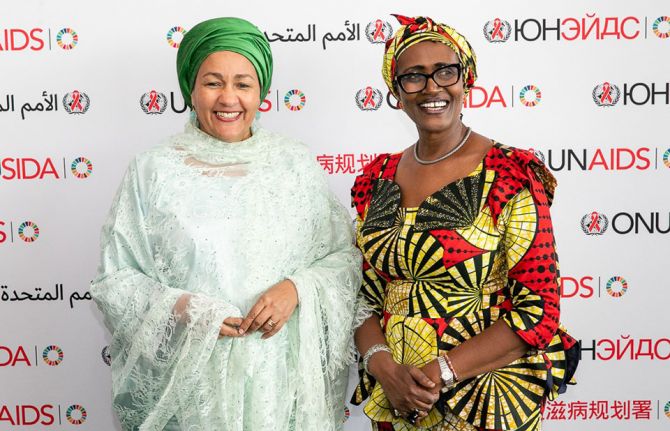
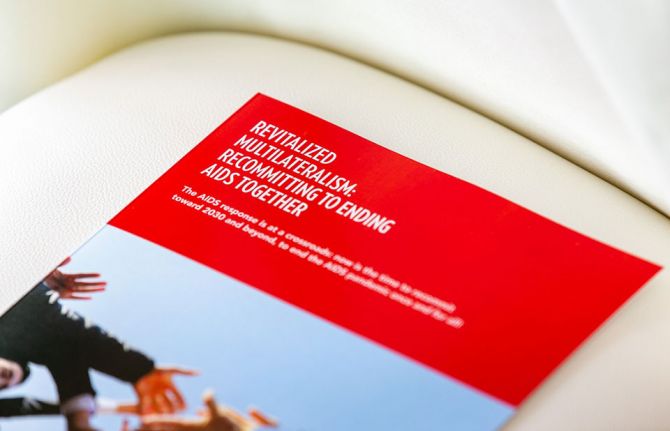
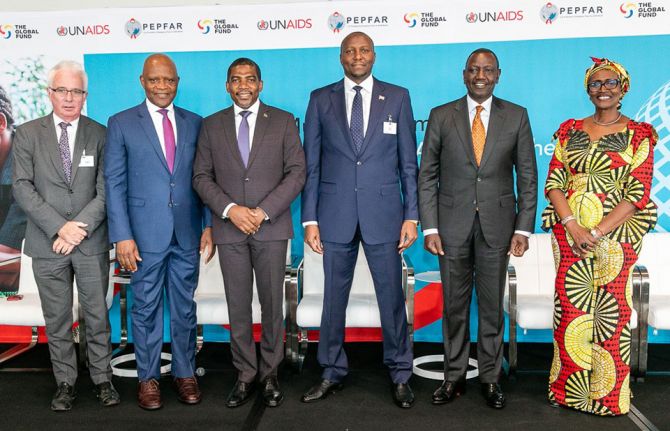
Press Release
Leaders pledge bold action to end AIDS by 2030
24 September 2024 24 September 2024Global leaders unite to recommit to ending AIDS during the 79th United Nations General Assembly in New York
NEW YORK/GENEVA, 24 September 2024—The extraordinary advances made in the global HIV response are a success story of multilateralism. At the end of 2023, 30.7 million people out of a total of 39.9 million people living with HIV worldwide were on life-saving treatment — four times higher than the 7.7 million who were on treatment in 2010. Since 2010, AIDS-related deaths have been halved and new HIV infections among children have been reduced by 62%.
At a special event at the UN General Assembly, co-convened by the Joint United Nations Programme on HIV/AIDS (UNAIDS), the United States President’s Emergency Plan for AIDS Relief (PEPFAR) and the Global Fund to Fight AIDS, Tuberculosis and Malaria, leaders pledged to sustain and accelerate investments, political leadership and policy reforms that will continue the momentum needed to end AIDS and sustain progress beyond 2030.
UNAIDS data shows that the end of AIDS as a public health threat is achievable by 2030, if countries, communities and partners close the gaps holding back progress.
The United Nations Deputy General-Secretary, Amina Mohammed, said the AIDS movement stood out as a beacon of hope and resilience and thanked leaders for committing to end AIDS by 2030: “The AIDS response has been a powerful testament to what is achievable when leaders unite, when communities are empowered, when inequalities are tackled, human rights are protected and when science-based policy is backed by political will.”
UNAIDS Executive Director Winnie Byanyima told the leaders making commitments, “you have proven the power of global solidarity, you have shown that multilateralism is not a theory – it is the way we save lives and keep the world secure. Ending AIDS is a political and financial choice. Today I am confident that you will make it a reality.”
Jerop Limo, a young Kenyan activist living with HIV, reminded leaders about the life-changing impact of progress in the HIV response: “As world leaders, your achievement in the HIV response is not only measured in numbers. Those numbers are me.”
Countries, communities and partners from around the world shared renewed commitments, include ensuring HIV prevention and treatment reaches everyone in need; ending HIV-related stigma and discrimination; accelerating research and innovation; and mobilizing additional domestic resources for HIV to sustain the progress in the HIV response.
A selection of quotes from leaders
President George W. Bush, in a video message recorded for the event, emphasized the need for steadfast commitment to reach global goals:
“In 2003, my administration launched PEPFAR with bipartisan support from Congress. Nearly 22 years later, PEPFAR has saved more than 25 million lives, and more than 5 million babies have been born HIV free. We are on the verge of an AIDS-free generation but at this critical moment the people of Africa still need our support. We should be proud of PEPFAR’s tremendous successes, and we should keep going until the job is done.”
William Ruto, President of Kenya:
“The undeniable success and impact of Kenya’s response to HIV demonstrates the potential of strong partnership. I must emphasize that our steadfast commitment to multilateralism has been the cornerstone of these achievements, enabling us to implement high impact interventions that have saved lives.”
Russell Dlamini, Prime Minister of Eswatini:
“The HIV response is our collective responsibility. Our journey is far from over and HIV/AIDS remains unfinished business. The 2030 target of ending AIDS as a public health threat may not be achieved unless we revitalize multilateralism and multisectoral approaches. Predictable and sustained funding for HIV/AIDS must be increased. Today I would like to take this opportunity to ask all stakeholders to recommit to supporting the HIV response.”
Terrance Michael Drew, Prime Minister of St Kitts and Nevis:
“It will be challenging for the Caribbean to maintain the gains we have made without the continued relationship with the international community. We have gained much but if we take our eyes off the ball we can lose much and what we have gained we should try not to lose. We cannot take our foot off the pedal but must continue to press until we get to the point where HIV/AIDS is no longer a public health crisis.”
John Nkengasong, Ambassador-at-Large and Coordinator of United States Government Activities to Combat HIV/AIDS Globally:
“We cannot be tired in the fight against HIV/AIDS. HIV/AIDS will not be tired with us. It is here with us. On behalf of PEPFAR we are committed to sustaining people on life saving treatment. Second, we are committed to working in partnership with everyone here to ensure we close the inequity gaps.”
Peter Sands, Executive Director of the Global Fund to fight AIDS, TB and Malaria:
“Two decades ago, AIDS was claiming millions of lives with devastating consequences for families and communities around the world. Together, we joined forces and rejected this injustice, forcing this disease into retreat. That remarkable progress we have made can be an inspiration for ending AIDS as a public health threat for good. It is a goal within our grasp. That requires reaching all people in need of HIV prevention and treatment services and breaking down all barriers to health services.”
Ms. Minata Cessouma Samate, African Union Commissioner for Health, Humanitarian Affairs & Social Development:
“There has been major progress in the last four decades of the AIDS response but to end AIDS this commitment must continue. On the African continent we need continued engagement and funding—for primary healthcare and to end AIDS. The AU commission is engaged but we need international support to ensure that everyone has access to quality HIV treatment and healthcare services and we need the transfer of technologies to be able to produce quality treatments on the continent. It is multilateralism that will allow us to end AIDS in Africa.”
Dr. Aaron Motsoaledi, Minister of Health of South Africa:
“South Africa has the largest burden of HIV in the world with 7.8 million people living with HIV and 5.8 million are on antiretroviral treatment, and we are in the process of putting 2 million more people on treatment. With domestic financing and with solidarity from multilateralism we are very confident that we can end AIDS by 2030.”
Dr. Shrimati Anupriya Patel, Minister of State for Health of India:
“This platform emphasizes the multilateralism needed to achieve the SDG goal of ending AIDS as a public health threat by 2030. Breaking the silence and building synergies is the mantra of the government of India and we are committed to achieving the target of ending AIDS as a public health threat by 2030. It is imperative to consolidate the gains made in this journey. I’m confident that with our collective efforts and genuine partnerships, we can build a future towards a healthier world.”
Mr. Pierre Dimba Minister of Health of Côte d’ Ivoire, Public Hygiene and Universal Health Coverage:
“Today’s focus on multilateralism is critical, because multilateralism has enabled important progress in the fight against AIDS. But the last few miles will be difficult because the challenges are many. We have put in place a plan, including a financing plan and have strengthened our surveillance systems and integrated health services which allows us to work more globally in our approach to HIV prevention, testing and treatment. But we need support from partners to strengthen our capacities and to allow us to benefit from new innovations so that our country isn’t left behind.”
Dame Emma Walmsley, Chief Executive Officer, GSK:
“Our commitment to get ahead of HIV together and ending the AIDS epidemic by 2030 is underpinned by three simple priorities. First, we believe in innovation, inspired by what matters most to the people that we serve. We are developing longer acting options exploring new types of innovative drugs that offer the option to treat at home and our focus on finding a cure is relentless. Secondly, we are committed to enabling access to our medicines, there is no point in innovation without it, regardless of who you are or where you live. Lastly, and that is what this is all about here today, we get ahead of disease together with the power of partnership. Working across sectors we enable the fastest rollout of a child friendly treatment now available in 90 countries and our commitment to communities is unwavering.”
Daniel O'Day, Chief Executive Officer, Gilead Sciences:
“Upon approval our intention is to make Lenacapavir available at no profit to Gilead in the countries where the need is greatest and until voluntary licensing partners can supply high-quality low-cost versions. We are working around the clock to finalize the direct voluntary licensing costs agreements that will facilitate rapid transfer of technology, allow Gilead to support licensees and getting up to speed quickly and help provide a robust network of manufacturers that is able to produce high volumes at competitive costs. It is my great hope and belief that we are on the brink of the next great advancement in the global fight to end HIV/AIDS.”
Silas Holland, Executive Director, Infectious Disease and Neuroscience Policy, Merck:
"Since 1985, Merck has been engaged in research and development efforts that have led to significant discoveries transforming the way that HIV is treated. The company is committed to continuing to invest in all stages of R&D to discover, develop and enhance access to innovative HIV treatments and prevention options, as well as developing novel agents for a cure, aiming to improve the lives of people living with HIV. Merck remains committed to collaborative efforts to end AIDS as a public health threat by 2030."
Rev. Gibstar Makangila, Executive Director, Circle of Hope, and Faith Representative, Zambia:
“Our commitment in the faith community and faith-based organizations is that by 2050 we expect 1 billion young people to be living in Africa. What are we going to do about that? What we propose is a new energy, a new engagement that is based on equity, love, tolerance and inclusiveness. As faith-community we are cognizant of the changing dynamics on the ground and therefore our commitment is that we will support all programmes based on an inescapable responsibility and also empathy, compassion, integrity, passion and ethics.”
Ms. Youk Sambath, Secretary of State, Ministry of Health, Cambodia:
“Cambodia has made huge progress in its national AIDS response. New HIV infections have been reduced by 46% and AIDS deaths by 36% from 2010 to 2023. Cambodia is one of seven countries worldwide to first reach the targets of 90-90-90 in 2017. I thank PEPFAR, the Global Fund, UN agencies and UNAIDS, without whom these results would not have been possible.”
Ms. Laura Rissanen, State Secretary, Ministry of Social Security, Finland:
“Today we are still facing many challenges—the global HIV response is at a crossroads and there is no time to waste. The ambitious goal to end AIDS by 2030 as a public health threat can only be achieved by putting human rights and gender equality at the core of HIV response efforts. Finland is strongly committed to enhancing human rights, in particular the rights of women and girls, LGBTQI people, and people living with HIV. We therefore value and support the human rights advocacy efforts of UNAIDS. We must all continue to pull together in these difficult times to ensure that we will reach the finish line leaving no-one behind.”
Mr. George Ternes, Director General for Development Cooperation and Humanitarian Aid, Ministry of Foreign Affairs, Luxembourg:
“We have all the tools and knowledge. We have everything we need to end AIDS by 2030. The message is that Luxembourg will be there. You can count on our continued support. It is normal that at the end of a fight, you confront the most difficult task. Now there are some really critical ones and the stigma that keeps you from living a normal life in society because you are under treatment for HIV/AIDS – it’s still existing, it’s a major obstacle.”
Ms. Carina Connellan, Director of the Multilateral Unit in the Development Cooperation and Africa Division, Department of Foreign Affairs of Ireland:
“UNAIDS is a longstanding and highly valued partner of Ireland. Ireland is committed to HIV prevention, especially for those at risk including adolescent girls and young women. Health systems strengthening is a priority for Ireland and we know that effective collaboration among global health actors is vital for strong and resilient health systems. It is very important to acknowledge successes, but we know that significant challenges remain. Ireland’s focus will be very much on reaching those who are furthest behind first. Ireland will continue to be a close partner of UNAIDS, and we will work together with affected communities and all stakeholders to end AIDS.”
Mr. Jean Bernard Parenteau, DG for Health and Nutrition, Global Affairs Canada:
“What really concerns us is the increased vulnerability of women and girls due to the stigma of accessing sexual and reproductive health services, which continues to threaten progress. This is one of the reasons that motivates Canada to commit to making the Global Fund replenishment a success. This also motives Canada to continue its 10-year commitment to global health and rights in the fight against AIDS. Comprehensive sexual and reproductive health and rights are key to the AIDS response. With a feminist approach, a rights-based approach, Canada is committed to 2030 and beyond.”
Mr. Haoliang Xu, Associate Administrator, UNDP, on behalf of UNAIDS co-sponsors:
“The Summit of the Future is about the future of multilateralism, so this is the first concrete step to follow up on the implementation of the pact for the future. For HIV we know the job is not done. Every minute someone dies of AIDS and 1.3 million new HIV infections occur every year so there is a lot still to be done. The co-sponsors of UNAIDS commit to multilateralism and to ending HIV as a public health threat by 2030 and to sustain progress beyond 2030. We are committed to scaling up programmes to achieve results because HIV is about livelihoods, it’s about rights and it’s about dignity. We are committed to working effectively to achieve the task we set out to achieve.”
The quotes shared above are only a sample from an event which featured commitments by dozens of leaders which are being compiled. UNAIDS will continue to update and share details.
UNAIDS
The Joint United Nations Programme on HIV/AIDS (UNAIDS) leads and inspires the world to achieve its shared vision of zero new HIV infections, zero discrimination and zero AIDS-related deaths. UNAIDS unites the efforts of 11 UN organizations—UNHCR, UNICEF, WFP, UNDP, UNFPA, UNODC, UN Women, ILO, UNESCO, WHO and the World Bank—and works closely with global and national partners towards ending the AIDS epidemic by 2030 as part of the Sustainable Development Goals. Learn more at unaids.org and connect with us on Facebook, Twitter, Instagram and YouTube.
Contact
UNAIDSSophie Barton Knott
tel. +41 79 514 6896
bartonknotts@unaids.org
UNAIDS
Michael Hollingdale
tel. +41 79 500 2119
hollingdalem@unaids.org
Watch high-level special event
Newsletter: UNAIDS — on our way to the 79th UN General Assembly
Press Release (including all new data on HIV)

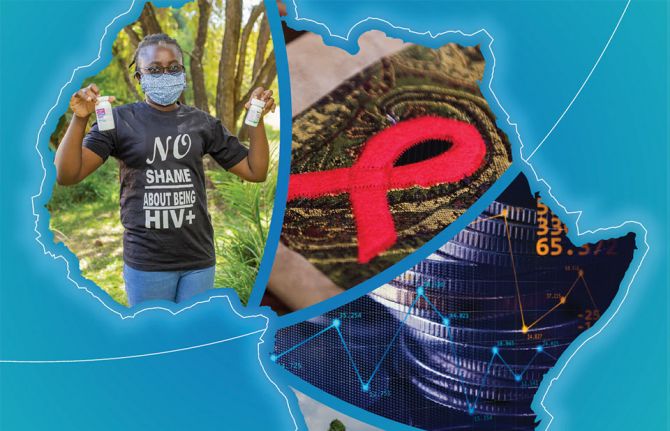
Press Release
New UNAIDS report shows that the debt crisis is choking sub-Saharan Africa, leaving health and HIV services chronically underfunded
19 September 2024 19 September 2024GENEVA, 19 September 2024—Growing public debt is choking sub-Saharan African countries, leaving them with little fiscal room to finance health and critical HIV services. A new report by UNAIDS, Domestic revenues, debt relief and development aid: Transformative pathways for ending AIDS by 2030 Eastern and Southern Africa | Western and Central Africa , shows that the debt crisis is putting in jeopardy progress made towards ending AIDS.
Sub-Saharan Africa accounts for the largest number of people living with HIV, with more than 25.9 million people of the 39.9 million living with HIV globally. The region’s success in having reduced new HIV infections by 56% since 2010 will not be sustained if fiscal space is constrained.
The report, released ahead of the 79th session of the United Nations General Assembly in New York, shows that the combination of growing public debt payments and spending cuts set out in International Monetary Fund agreements in the next three to five years will, if unaddressed, leave countries dangerously under resourced to fund their HIV responses.
“When countries cannot effectively look after the health care needs of their people because of debt payments, global health security is put at risk,” said UNAIDS Executive Director Winnie Byanyima. “Public debt needs to be urgently reduced and domestic resource mobilization strengthened to enable the fiscal space to fully fund the global HIV response and end AIDS.”
Debt servicing now exceeds 50% of government revenues in Angola, Kenya, Malawi, Rwanda, Uganda, and Zambia. Even after debt relief measures, Zambia will still be paying two-thirds of its budget on debt servicing between 2024 and 2026.
There has been a noted decline in HIV response spending since 2017 in Western and Central Africa, from 0.3% of GDP in 2017 to just 0.12% in 2022.
Western and Central Africa will need to mobilize US$ 4.18 billion to fully fund the HIV response in 2024. This will climb to US$ 7.9 billion by 2030 unless efforts are scaled up today to stop new HIV infections.
While US$ 20.8 billion was available for the HIV response in 2022 in low and middle-income countries through both domestic and international sources, this funding was not enough to sufficiently finance the HIV response. Western and Central Africa for example had a funding shortfall of 32% in 2022.
In 2024 alone, Eastern and Southern Africa will need to mobilize almost US$ 12 billion to fully fund the HIV response. This amount will climb to around US$ 17 billion by 2030 unless new HIV infections are reduced.
To enable increased domestic resource mobilization for countries to respond effectively to their pandemics, sub-Saharan African countries will need to strengthen their tax systems, including closing tax exemptions which currently cost countries an average of 2.6% of GDP in lost revenue across the region. Donors need also to scale up financial assistance for health and the HIV response between now and 2030, while creditors should offer debt relief to heavily indebted countries to ease the burden.
“World leaders cannot let a resource crunch derail global progress to end AIDS as a public health threat by 2030,” said Ms Byanyima.
Report launch
UNAIDS
The Joint United Nations Programme on HIV/AIDS (UNAIDS) leads and inspires the world to achieve its shared vision of zero new HIV infections, zero discrimination and zero AIDS-related deaths. UNAIDS unites the efforts of 11 UN organizations—UNHCR, UNICEF, WFP, UNDP, UNFPA, UNODC, UN Women, ILO, UNESCO, WHO and the World Bank—and works closely with global and national partners towards ending the AIDS epidemic by 2030 as part of the Sustainable Development Goals. Learn more at unaids.org and connect with us on Facebook, Twitter, Instagram and YouTube.
